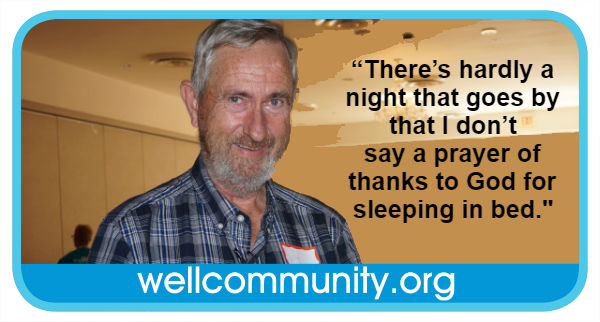 Well member PT knows the challenges of both mental illness and homelessness well. Although he could afford to pay rent, when the symptoms of his bipolar schizoaffective disorder became more acute, it was hard for him to find a place to stay. “I didn’t have the sense to try to figure out a place to live,” he says.
Well member PT knows the challenges of both mental illness and homelessness well. Although he could afford to pay rent, when the symptoms of his bipolar schizoaffective disorder became more acute, it was hard for him to find a place to stay. “I didn’t have the sense to try to figure out a place to live,” he says.
PT estimates he’s been homeless a dozen times over the years, for up for four months at a time. “I would walk, I would hitchhike, I would hop on freight trains; and of course, I had no money,” he recalls. “I was too ashamed to beg, so I would eat out of trash cans or dumpsters.”
For many like PT, the challenges of living with a mental illness make obtaining housing a struggle. People who deal with mental disorders often find it difficult to to find or hold down jobs, stick with their treatment plans and maintain connections with friends and family who can support them—all of which put them at a higher risk for becoming homeless.
Individuals in the Dallas area who struggle with mental health conditions face an additional hurdle: lack of affordable housing. A March 2018 study by the National Low Income Housing Coalition revealed that the Dallas-Fort Worth-Arlington area is among the bottom five metropolitan areas in the United States in the availability of low-income housing units: just 19 units exist for every 100 extremely low-income households, compared to the national average of 35 units per 100 households. This shortage makes it even more difficult for those in the Dallas area who manage mental health conditions to find places to live.
During the 2018 Point in Time Homeless Count, a census of people experiencing homelessness conducted on January 25, 2018, 4,140 homeless individuals were counted in Dallas and Collin Counties. More than half of those interviewed said they’d been homeless for over a year.
Many of them also struggle with a mental health condition. For them, homelessness is a roadblock to recovery. The challenges of living on the street—from lack of access to health care to sleep deprivation—can make a mental illness more difficult or impossible to manage. For many, being homeless means being cut off from community, and without a support system that can help them take steps toward recovery.
But on the flip side, obtaining housing can be a first step toward recovery. The 2017 State of the Homeless Address called housing “the most effective response to homelessness with persons presenting with disabling conditions including mental health, addictions, and other disabilities.”
The Well Community provides a home and community for men struggling with chronic mental illnesses through Jacob’s House, a City of Dallas licensed boarding house. It also provides a sense of belonging for all its members through programs like its Community Life Center and Thursday Night Life. At The Well, they find a support system and connect with others who understand their struggles, both factors that prevent homelessness.
“Coming here to The Well has helped with my mental health,” shares PT, who’s been a member of the Well Community since 2005. “It makes me feel more like I’m a human being. … It is a community and family for those of us that don’t have families.”
Over the years, PT has stayed in shelters and with family members. Now, he rents a room from another Well Community member, Thomas, in the house where Thomas grew up. PT’s gratitude is obvious. He shares, “There’s hardly a night that goes by that I don’t say a prayer of thanks to God for sleeping in bed.”
The Well Community offers support and community for individuals dealing with serious mental illnesses. Your gift to The Well will help address underlying issues that lead to homelessness among these individuals, and provide them with opportunities to pursue self-sufficiency.
